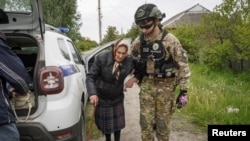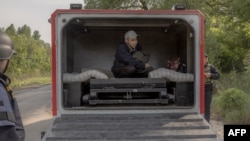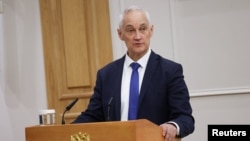The United States is working hard to rush weapons to Ukraine to fight against a surprise Russian ground offensive in the northeastern Kharkiv region, the White House said Monday.
"We're doing everything humanly possible, both ourselves and our allies," White House national security adviser Jake Sullivan told reporters, adding that a new arms package would be announced "in the coming days."
Outmanned and outgunned, Ukrainian forces are waiting for the badly needed U.S. military aid to arrive.
In the past two days, Moscow has captured about 106 square kilometers (41 square miles) and at least seven villages, most of them already depopulated, according to the open-source monitoring project DeepState on the Telegram messaging channel.
The channel, which is close to the Ukrainian military, said Russian forces aim to hold Ukrainian forces in the northeast while fighting also rages in Donetsk, southeast of Kharkiv.
Ukrainian President Volodymyr Zelenskyy said in his Sunday video address that the battles in the Donetsk area were “no less intense” than in Kharkiv, adding that the Kremlin aimed to “spread our forces thin” by opening a second active front in Kharkiv.
Russia "carried out 22 assaults" in five border areas on Sunday, 14 of which were ongoing, the Ukrainian army said, adding that the situation in Kharkiv was "complex and dynamically changing.”
Kharkiv Regional Governor Oleh Syniehubov wrote on social media Monday that over the last 24 hours, "more than 30" towns and villages "were struck by enemy artillery and mortar attacks," wounding at least nine people.
Some areas were also bombed by Russian aircraft, Syniehubov said, adding that about 6,000 people had been evacuated from their homes in the area since the start of the offensive.
Only 200 to 300 residents remain in Vovchansk, a border town with a pre-war population of 2,500. The town, in the line of fire, was barraged by "massive shelling" Sunday, Syniehubov said.
The Ukrainian military said Monday that it had repelled Russian forces from moving closer to the village of Lukyantsi to the north in the Kharkiv region, where it noted the Russians had a "partial success," deploying "significant forces numbering up to five battalions in the border town of Vovchansk.”
In the Kharkiv region, "the gray zone and the front line are expanding," as Russian forces are "trying to deliberately stretch it, attacking in small groups in new directions," Syniehubov said on national television.
The Russian Defense Ministry said Monday that the Russian army had improved its tactical position near four settlements in the Kharkiv region — Vesele, Neskuchne, Vovchansk and Lyptsi.
Reuters could not independently confirm battlefield reports.
The European Union pledged long-term security support for Ukraine in a draft document first reported by Germany’s Welt am Sonntag newspaper over the weekend.
In the document, the EU promised more weapons, military training and other aid to Ukraine for years to come. Officials hope to finalize the draft in June or July.
Ukraine attacks
Russia’s Defense Ministry said Monday that the country’s air defenses had destroyed 31 drones and 16 missiles that Ukraine launched in overnight attacks.
Regional authorities in the Kursk border region of Russia said one woman was killed and three other people were wounded when a drone struck several cars.
Ukraine also struck the Russian-held Luhansk region, according to a Moscow-appointed official.
The Russian Ministry of Defense said seven drones and four guided missiles were shot down over Russia-occupied Crimea, eight drones were destroyed over Kursk and four drones were intercepted over the Lipetsk region.
The focus of the Ukrainian attack was the Belgorod region, which borders Ukraine. The Russian Defense Ministry said it destroyed 12 drones and 12 guided missiles over Belgorod.
The attack in Belgorod came a day after a Ukrainian missile attack killed at least 15 people and injured more than 30 others, the regional governor said Monday.
Russia’s new war economy
Russian President Vladimir Putin’s move to appoint an economist as the country's new defense minister indicates Moscow’s intention to build a war economy, Ukrainian presidential adviser Mykhailo Podolyak said Monday.
"Russia is moving almost its entire economy onto military lines. It will be a militaristic country, and its economy will be built exclusively to produce for the military," Podolyak told Reuters.
Putin on Sunday named Andrei Belousov, 65, a former deputy prime minister who specializes in economics, as his new defense minister.
Former Defense Minister Sergei Shoigu will become the secretary of Russia's powerful Security Council and have responsibilities for the military industrial complex, the Kremlin said.
"Without a doubt, these changes that we see today, they are evidence of the complete transformation of the Russian Federation," Podolyak said.
Some information for this story came from The Associated Press, Agence France-Presse and Reuters.







